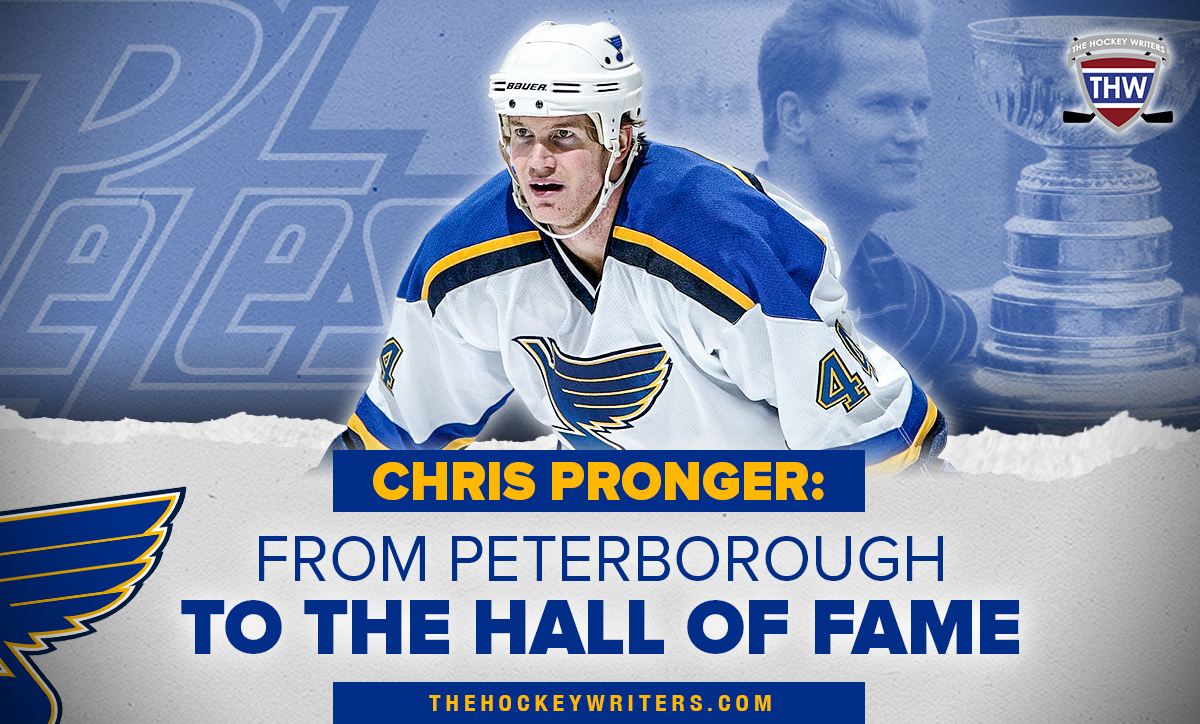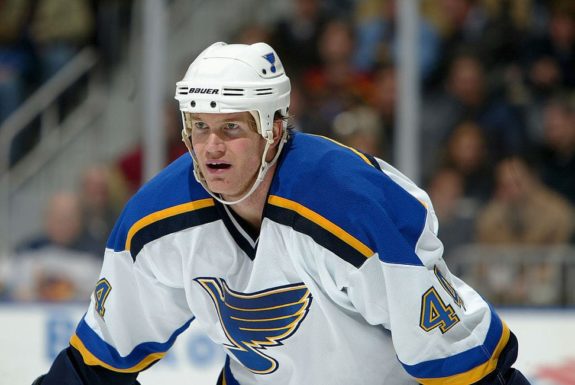In 1991, the Ontario Hockey League’s Peterborough Petes took a risk in the sixth round of their Priority Selection: they gambled on a young defenseman who insisted he intended to join his brother Sean in the NCAA at Bowling Green State University. He was a top OHL prospect, and the Petes took a risk on a player who didn’t intend to play in the OHL, but they never could have predicted quite how big a legacy the player they just drafted would build.

The young defenseman was Chris Pronger, and he would go on to help lead the Petes to win an OHL Championship in the 1992-93 season. But his career didn’t stop along the banks of the Otonabee River. Pronger would go on to win a Hart Trophy, join the elusive Triple Gold Club, and ultimately enter the Hockey Hall of Fame in 2015. Along the way, Pronger built a reputation as one of the nastiest and most intimidating defensemen in the history of the NHL.
2 Remarkable Seasons in Peterborough
The Petes’ bold choice paid off immediately. Pronger changed his mind, headed to Peterborough, and made an impact right away. The Petes finished the season prior with 73 points, squarely in the middle of the Leyden Division. With Pronger in the fold the following season, they won the division with 89 points. Their freshman defenseman scored 62 points in 63 games and helped the Petes reach the third round of the playoffs. The following season, he went even further: with 77 points in 61 games, he led the Petes to 97 points, 14 more than any other team. They won the OHL Championship comfortably in 21 games, during which time Pronger scored 40 points.
His remarkable OHL career would end up being a short one. The Hartford Whalers saw enough in those two seasons to select Pronger second overall in the 1993 NHL Entry Draft and call him up to the NHL immediately. Despite the brevity of his juniors career, he racked up accolades and accomplishments left and right: he made the All-Rookie Team, and in addition to the championship in 1992-93, he was named the OHL Most Outstanding Defenseman and the CHL Defenseman of the Year and was named to the OHL and CHL First All-Star Teams. It was also then that Pronger helped Team Canada win gold at the 1993 World Junior Championship. In just two seasons, he accomplished about as much as a player could dream of in the Canadian Hockey League, and it was time for a bigger challenge.
From Hartford to St. Louis
Pronger’s transition to the NHL wasn’t quite as frictionless as his first season in Peterborough. but he was a fixture in the Whalers’ lineup. He finished with just 30 points but played all 81 games. In a strong rookie class that included Martin Brodeur (winner), Jason Arnott, and Mikael Renberg, Pronger did not receive any Calder Memorial Trophy votes for the NHL’s rookie of the year. But he did join those other finalists on the League’s All-Rookie Team.
Despite missing out on Calder consideration, no one doubted Pronger’s future as a top-end blueliner in the NHL. However, midway through the 1994-95 season, the Whalers were a bubble team in financial distress, probably well aware of the threat of relocation (which ultimately came just over two years later), and they wanted a spark. So general manager Jim Rutherford shopped the blue-chipper for a potential star who could make a major impact.
The St. Louis Blues had one in 26-year-old Brendan Shanahan, who had 41 points in 45 games so far that season. They struck a deal, and the two franchises were forever changed. Shanahan would finish the season with Hartford but be traded very early the following season to the franchise where he would build his legendary resume: the Detroit Red Wings. But Pronger would go on to become one of the greatest players in the history of the Blues franchise.
Becoming a Blues Legend
The Blues had two advantages that the Whalers did not: the ability to be patient, and the ideal mentor. The team had not missed the playoffs since the 1978-79 season, so they knew they were competitive. The mentor was Al MacInnis, the veteran and former Conn Smythe Trophy winner whom the Blues acquired from the Calgary Flames the season prior. Whether they knew it or not, the team now had two future Hockey Hall of Fame inductees and franchise legends in the fold.
Related: Blues’ Back-to-Back Norris Trophy Winners
Pronger took time to mature in his new home. He had just 25 points in 78 games in his first season with the Blues and was minus-18 on the season. The following season, he took a major step forward, finishing with 35 points in fewer games, and improving to a plus-15 finish. That was enough of an improvement for the team to name him captain after Wayne Gretzky departed. The following season, he led the league in that category at plus-47, made the second All-Star Team, and was a finalist for the Norris Trophy. Though injuries would come to plague and ultimately end Pronger’s career, when he was in the lineup, he was the definition of a workhorse. In the 1998-99 season that followed, the first where time-on-ice (TOI) numbers are reliably available, he logged 30:36 per night, playing over half of each game on average.
The 1999-2000 season that followed is Pronger’s greatest season and one of the most remarkable seasons by an NHL defenseman in history. He once again led the league in plus/minus, at plus-52. He cut his penalty minutes, which typically surpassed the century mark with ease, down to just 92. He recorded 62 points in 79 games, and once again played over half of each game on average, with 30:14 TOI. He led the league in both defensive point shares (9.6) and overall point shares (PS, 14.8). His resume was enough to convince the powers that be to give him not only the Norris Trophy for the league’s best defenseman but also the Hart Trophy for the league’s most valuable player. To this date, Pronger remains the last defenseman to win the Hart Trophy.

Eventually, the Blues would enter a rebuild, and Pronger’s stint with the team would come to an end. But his legacy will stand forever. He played 598 games with St. Louis, logging 356 points and finishing at plus-140 for his tenure, the best such mark in franchise history. Throughout the seasons where data is available, he averaged a remarkable 29:03 TOI, and he had 76.9 PS with the team. He won the Norris and Hart Trophies, and his first gold medal with Team Canada during the 2001-02 season. Unfortunately, bad mismanagement, a looming lockout, and a potential sale led the Blues to trade anyone with a salary, which caused them to trade him to the Edmonton Oilers for a package that included future team captain Eric Brewer. Though he was done with the Blues, his legacy was just getting started.
3 Teams, 3 Stanley Cup Finals
Pronger would move on from the Blues to play for three more teams, but unbelievably, he would help carry each team to a Stanley Cup Final in his first season with the new franchise. Following the canceled season of 2004-05, Pronger joined an Oilers team that had missed the playoffs the season before the lockout. He logged 56 points in 80 games, averaging just under 28 minutes per game, and got the team back into the playoffs. With 21 points in 24 games in those playoffs, he helped the Oilers get all the way to the Stanley Cup Final, but they fell in seven games, ironically to the team that once traded him, the now-relocated Carolina Hurricanes.

Having just lost to him in the Western Conference Final, Anaheim Mighty Ducks’ general manager Brian Burke believed Pronger was the missing link he needed to win a Stanley Cup and traded several young pieces and futures to the Oilers to get Pronger in the fold. His calculation was right. Pronger collected 59 points in just 66 regular-season games with Anaheim, was plus-27, and logged over 27 minutes a game. It was his fourth and final season as a Hart Trophy finalist. The loaded Anaheim squad believed the Stanley Cup was their only benchmark for a successful season, and they achieved it in pretty quick fashion, winning 16 of 21 games. It would be the lone Stanley Cup of Pronger’s career.
After 220 games in Anaheim, in which he tallied 150 points, averaged 26:41 TOI, and had 28 PS, the Ducks moved on from Pronger, trading him to the Philadelphia Flyers. Once again, the defenseman would lead his new team to a Stanley Cup Final in his first season there. He collected 55 points and was plus-22 in 82 games, and played all 23 playoff games. During that season, he would also play seven games in the Olympics with Team Canada, winning his second gold medal in the process. The Flyers became the first victims of the fledgling Chicago Blackhawks dynasty, but Pronger left an indelible mark on his new franchise.
Unfortunately, now 36, injuries began to catch up to the veteran. He managed only 50 games the following season, and just 13 the season after, but still logged 26:41 in what would become the final game of his career, Nov. 19, 2011, against the Winnipeg Jets. The Flyers held onto Pronger’s rights for several more seasons before trading his contract to the Arizona Coyotes, a team for whom he would never play. Because it had been over three years since he last played, he would be named to the Hockey Hall of Fame just three days after that trade, even though he would not officially retire until his contract expired in 2017.
Prongers Hall of Fame Legacy
One of the nastiest players to ever play the game, Pronger played his game with an edge that might not be allowed in modern hockey. But his legacy as a physical player should not take away from his incredible skill. All told, he had 698 points and was plus-183 with 139.4 point shares in 1,167 career games. He won a Norris Trophy, a Hart Trophy, and is one of just 29 players and 11 Canadians in the elusive Triple Gold Club. He joined the Hockey Hall of Fame in 2015, and during their centennial celebration in 2017, the NHL would name him one of their 100 greatest players ever.
Despite going to the Stanley Cup Final with three different teams and winning the Cup itself with Anaheim, Pronger’s legacy still looms largest with the Blues, where he spent the prime of his career and had one of the most impressive seasons any defenseman has ever had in the NHL. The Blues announced their intention to retire his number 44 over a year ago; however, they chose to delay the ceremony until the building could be full to show him the proper respect. His jersey will be lifted to the rafters on Jan. 17, 2022, in a ceremony at Enterprise Center in St. Louis.
